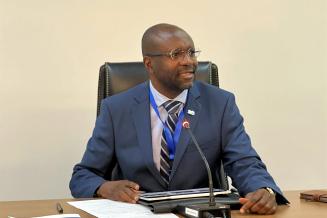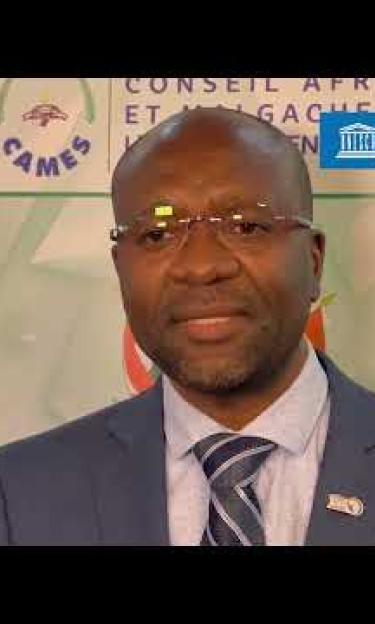News
Strengthening the Partnership for Higher Education in Africa: UNESCO and CAMES Envisioning the Future

To bolster high-level policy discussions and partnership synergies in higher education in Africa, UNESCO took part in the 40th session of the Council of Ministers of the African and Malagasy Council for Higher Education (CAMES) held in Niamey, Republic of Niger from May 23-27. This high-level event was paralleled by the 6th meeting of the CAMES Technical and Financial Partners Network. Founded in Niamey (Niger) in 1968 by the Heads of State, CAMES is a regional body that integrates policies and systems of higher education and research in 19 countries in sub-Saharan Africa and Madagascar. To support this endeavor, the CAMES Council of Ministers established the Network of CAMES Technical and/or Financial Partners (RPTFCAMES) during its 31st ordinary session in Libreville, Gabon, in 2014. The 6th statutory meeting of this network was held in Niamey, Niger, on May 25, 2023.

A Focus on Collaboration and Action
At the opening session of the meeting of the CAMES PTFs network, Prof. Souleymane Konaté, the newly elected Secretary-General of CAMES, shared his vision for the organization's next five years. After reviewing the activities planned for 2022, the network's secretariat allowed each financial partner to present their 2023-2024 action plan, highlighting actions intended to support CAMES. During this strategic session, UNESCO introduced the Campus Afrique program, aimed at strengthening African higher education, which has been facing numerous challenges for several decades, including underfunding, under-equipped research laboratories, and mismatches between training offers and job market needs.
Based on the recommendation of the newly appointed Secretary General of CAMES, Dr. Dimitri Sanga, Director of the UNESCO Dakar Regional Office, was unanimously reappointed as Chair of the Network. This extension marks the continuity of leadership for an additional year, maintaining the steadfast commitment of UNESCO to higher education in Africa at this pivotal junction. The upcoming years will see strengthened collaboration and focused actions in higher education, promising transformative impacts across the African continent, in continuity with the Transformation Education Summit.
There was a consensus on multiple facets: ensuring harmonization, quality assurance, sourcing financial support for CAMES initiatives, facilitating mobility of educators and learners, as well as bolstering research, with a focus on leveraging research findings for informed decision-making. These represent the key domains where the PTF will provide assistance to CAMES

UNESCO's flagship program, Campus Afrique
His Excellency Ouhoumoudou MAHAMADOU, the Prime Minister of Niger, led the formal inauguration of the 40th Session of the Ministers' Council of CAMES on May 26, 2023. In attendance were ministers tasked with higher education and research from 14 out of the 19 member countries of the institution, along with a plethora of other distinguished personalities.
Dr. Dimitri Sanga, made an impressive intervention at the Council of Ministers of CAMES where he introduced UNESCO's flagship program, Campus Afrique, which responds to the myriad challenges faced by African higher education. His speech emphasized four components of this program: networking high-value scientific and technological laboratories; prioritizing vocational and technical training in response to massive unemployment; recognizing qualifications through the Addis Convention and the UNESCO Global Convention; and establishing quality assurance mechanisms within member states.
In parallel, various bilateral meetings and work sessions were held between UNESCO and delegations from Benin, Niger, and the Democratic Republic of Congo (DRC). These discussions highlighted the non-ratification of the Addis Convention and the Global Convention, and stressed the members states to take advantage of the benefits and assets of these two treaties for higher education. In addition, bilateral meetings were held with the German Research Foundation (DFG) and the German Academic Exchange Service (DAAD) to explore potential collaborations. These meetings focused on synergies around HAQAA3's new initiative, data and statistics production on higher education, and the implementation of quality assurance mechanisms related to UNESCO's recognition of qualifications conventions.
Looking ahead, the collaboration between UNESCO and CAMES is poised to set new benchmarks on higher education. With a focus on inclusivity, quality, and relevance, the partnership will steer the path towards a prosperous and knowledge-intensive future for Africa. It is through such collaborations that we inch closer to achieving the United Nations' Sustainable Development Goal 4, which seeks to "ensure inclusive and equitable quality education and promote lifelong learning opportunities for all." as emphasized by Dr. Dimitri Sanga.










